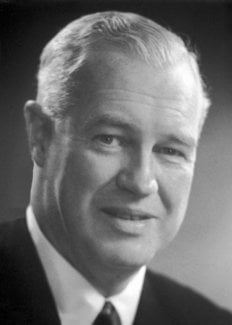Lord Todd
Biographical

Sir Alexander Robertus Todd was born in Glasgow on October 2, 1907, the elder son of Alexander Todd, a business man of that city, and his wife Jean Lowrie. He was educated at Allan Glen’s School and Glasgow University, where he took his B.Sc. degree in 1928 and, after a short initial research training with T.S. Patterson he proceeded to the University of Frankfurt-on-Maine. Here he studied under W. Borsche and obtained his Ph.D. (Dr.Phil.nat.) in 1931 for a thesis on the chemistry of the bile acids.
Returning to England he worked from 1931-1934 on anthocyanins and other colouring matters with Sir Robert Robinson, the Nobel Prize winner, and took a Ph.D. degree at Oxford University in 1933.
Todd went back to Scotland in 1934 when he joined the staff of Edinburgh University under G. Barger. Two years later, i.e. in 1936 he moved to the Lister Institute of Preventive Medicine, Chelsea, and became Reader in Biochemistry in the University of London in 1937.
In 1938 he was appointed as Sir Samuel Hall Professor of Chemistry and Director of the Chemical Laboratories of the University of Manchester, which position he held until 1944, when he accepted an appointment as Professor of Organic Chemistry at Cambridge University and Fellow of Christ’s College.
Todd’s work has gained him recognition in many universities and countries. He holds the D.Sc. degree of Glasgow University and has had bestowed upon him honorary doctorates from the Universities of Kiel (Dr.rer.nat.), Glasgow (LL.D.), Hon.D.Sc. London (1958), Madrid (1959), Exeter (1960), Leicester (1960), Aligarh (1960), and in 1961 Wales, Yale and Sheffeld; also Hon.LL.D. from Melbourne in 1960. He is a Fellow of the Royal Society, foreign member of the National Academy of Sciences, the American Academy of Arts and Sciences, the Austrian Academy of Sciences and the Spanish Council of Scientific Investigation, and an honorary member of the French, German and Spanish chemical societies and member of the Deutsche Akad. Naturforscher Leopoldina, Halle, (1959). He holds the Meldola Medal of the Royal Institute of Chemistry and the Society of Maccabeans; the Davy Medal and Royal Medal of the Royal Society, the Cannizaro Medal of the Italian Chemical Society and the Lavoisier Medal of the French Chemical Society. He has been Tilden Lecturer and Pedler Lecturer of the Chemical Society, Bakerian Lecturer of the Society of Chemical Industry, also visiting professor at California Institute of Technology (1938), the University of Chicago (1948), Sidney University (1950), Massachusetts Institute of Technology (1954) and the University of California (1957). He was elected Hon. Member, New York Academy of Sciences (1959), Hon. Fellow of the Royal Australian Chemical Institute (1960), President of the Chemical Society, London, 1960-1962, Master of the Worshipful Company of Salters, 1961-1962.
Todd has taken considerable interest in international scientific affairs; he is President of the International Union of Pure and Applied Chemistry, and Chairman of the British National Committee for Chemistry. He has served on many Government Committees and in 1952 was elected Chairman of the British Government’s Advisory Council on Scientific Policy. He is a Managing Trustee of the Nuff’eld Foundation.
The main subjects of Todd’s researches have been the chemistry of natural products of biological importance and, in addition to the nucleotide and nucleotide coenzyme studies described in his Nobel Lecture, the chemistry of vitamins B1, E and B12, the constituents of Cannabis species, insect colouring matters, factors influencing obligate parasitism and various mould products.
Knighted in 1954, he was raised to the Peerage in March, 1962, being created Baron Todd of Trumpington.
Lord Todd is married to Alison Sarah, daughter of Nobel Prize winner Sir Henry Dale, and they have a son, Alexander Henry, and two daughters, Helen Jean and Hilary Alison.
This autobiography/biography was written at the time of the award and first published in the book series Les Prix Nobel. It was later edited and republished in Nobel Lectures. To cite this document, always state the source as shown above.
Lord Todd died on January 10, 1997.
Nobel Prizes and laureates
Six prizes were awarded for achievements that have conferred the greatest benefit to humankind. The 14 laureates' work and discoveries range from quantum tunnelling to promoting democratic rights.
See them all presented here.
